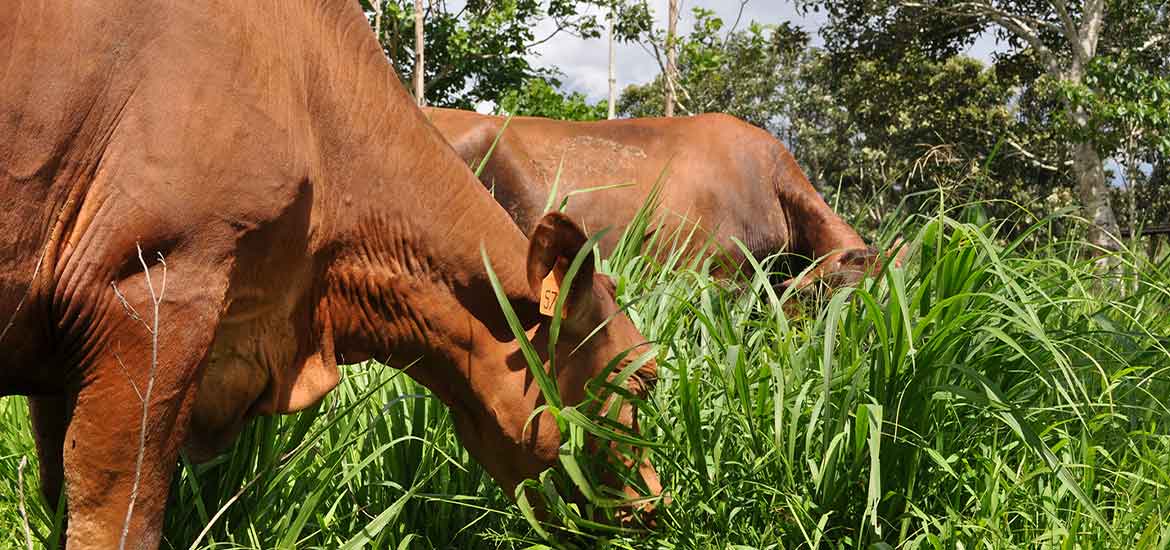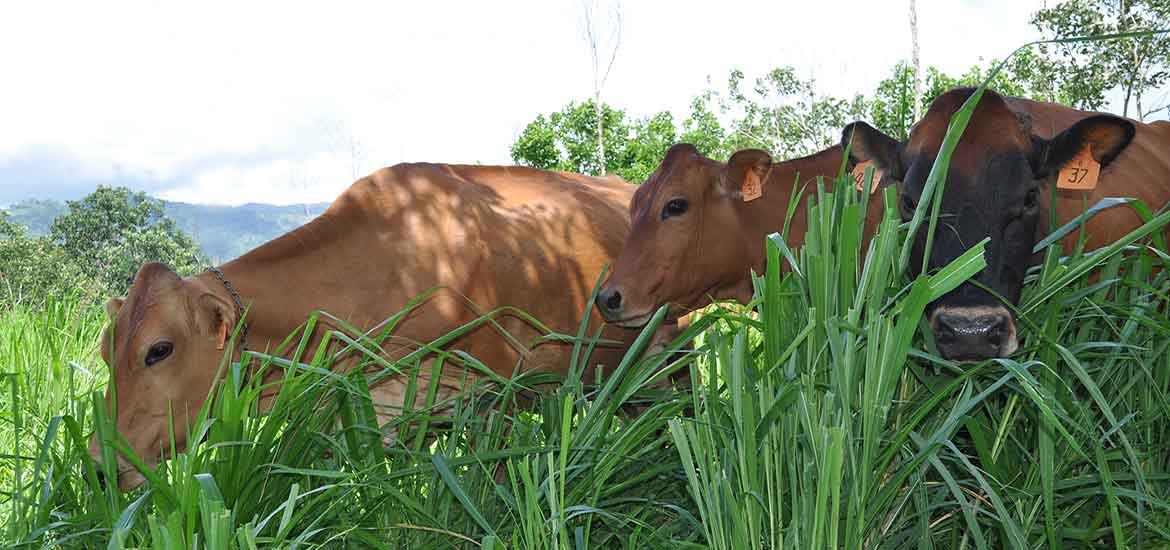Resilient livestock systems


Livestock is the main land use in Latin America and the Caribbean. Globally, the demand for animal protein sources, such as meat and milk, has increased rapidly due to the growth of the human population, the increase in the average income level and changes in lifestyle. The growth of this activity has a significant impact on the environment and natural resources, such as air, soil, water and biodiversity in general.
Livestock is currently at the center of a crossroads in which different regional and global challenges converge (climate change, rural poverty, health, security and food sovereignty, emigration of the youth population and others), which affect socioeconomic indicators and livelihoods of livestock families. In this sense, research for development in this sector goes beyond the traditional limits of animal production sciences and imposes the consideration of many other factors to achieve resilient, productive, competitive systems with minimal impact on human health.
Sustainable livestock intensification
Seeks efficiency in productivity per unit area through the incorporation of silvopastoral systems and good practices to make management more efficient without increasing the area under pasture. The benefits are obtained from the liberation of unproductive areas for rehabilitation and / or restoration, and the reduction of environmental degradation, increase in tree cover and biodiversity, increase in carbon sequestration, administration and management of water resources, emissions reduction and promoting adaptation to climate change.
La protección y restauración del ecosistema basado en la intensificación productiva mejoran la interacción entre las plantas, la vida animal y humana, y aseguran la salud del planeta. En este sentido, se promueve el enfoque One Health como una forma de recuperación verde del sector post COVID-19.
Since 1995, CATIE has made a change in the approach to livestock paradigms and went from the traditional approach to livestock management (animal nutrition, genetics, etc.) to a holistic approach that seeks the development of sustainable livestock that integrates environmental, economic, productive, and social aspects.
Livestock and Environmental Management Program (GAMMA)
The purpose of the GAMMA is to carry out research for development and search for alternatives to:
- Reduce environmental degradation in water, soils, and pastures
- Increase productivity and profitability in livestock farms
- Generate environmental services in livestock territories
- Promote synergies between adaptation and mitigation
- Promote business models based on different financial and non-financial incentives for livestock intensification
- Generate inputs and instruments for public and private policy decision-makers
La meta de GAMMA es promover la intensificación sostenible de los sistemas de producción ganadera a lo largo de la cadena de valor, lo cual implica conocer la estructura y función de sus componentes y sus interrelaciones para, con base en estos, diseñar estrategias que contribuyan a incrementar la productividad, competitividad y sostenibilidad de los sistemas ganaderos en un contexto de clima cambiante para América Latina y el Caribe.
Comprehensive sustainable approaches such as the design and implementation of silvopastoral systems, together with a series of good livestock management practices, have shown successful results for the improvement of productivity and profitability, the generation of ecosystem services, adaptation to climate change and the reduction of the carbon footprint compared to livestock based on traditional approaches.
Thanks to an intense effort with about 20 years of research for development , it has been possible to reconcile the environmental, social, and economic, and turn them into axes of work. Through the execution of implementation research and development projects in the field, at CATIE we have led participatory training processes for families, students, technicians, and extension workers in the livestock sector.
We promote governance spaces to facilitate the exchange of knowledge, experiences and awareness-raising actions and, additionally, we generate technical inputs for policy decisions, which are integrated for compliance with their NDC and NAP.
We do this by promoting and evaluating the adoption of silvopastoral systems (SSP) and good management practices (GMP) on farms, characterizing the livelihoods of ranchers and their families, participatory training (using the methodology of field schools) with organized groups of producers, undergraduate and graduate students, sector technicians and academics, among others, on issues related to sustainable livestock, which is why the GAMMA program has been very successful and has been able to fulfill the demands and expectations of different partners in the countries of the region.
En el contexto del cambio climático global y en relación con el manejo de la ganadería tradicional en América Latina, hemos contribuido a la cuantificación de la cantidad de carbono en las pasturas y la reducción de la emisión de gases de efectos invernadero (GEI). Se sabe que la ganadería contribuye a 18% de las emisiones de gases de calentamiento global. Sin embargo, el uso de especies forrajeras de alta calidad resulta en la reducción de la emisión de metano en el proceso de fermentación y la implementación de sistemas silvopastoriles, en un incremento de la captura de carbono.
Likewise, we have implemented a life cycle analysis methodology to quantify GHG emissions in traditional and silvopastoral systems. We have also created a CO2 fix model that quantifies the carbon stock in different land use systems and a CO2-Land model to model the impacts of various land uses on livestock farms at the territorial level. In general, the different results have been used to develop tools that have served the region's policy makers to formulate and / or adjust the countries' livestock farming policies.
Based on the different results, the GAMMA has established farm models in various ecosystems in the region to improve animal production and carbon sequestration on these farms, with the aim of massing the implementation of silvopastoral systems in livestock farms. A database of carbon (soil, grass, tree) and of animal and forest production systems has been developed for the humid, sub-humid and dry tropics.
Additionally, we work on analysis of environmental policies and their socioeconomic and environmental impacts, as well as on the definition of market incentives for the sustainable management of livestock activity.
In different areas of Central America, the GAMMA program has established pilot farms, which it uses as centers for experimentation and replication of silvopastoral technologies that encourage the development of sustainable livestock with high potential for adaptation to climate change, which - through implementation of good practices - contribute to the mitigation of greenhouse gases to reduce the effects of global climate change. GAMMA also actively works on training aimed at various actors in the livestock sector in the region.
